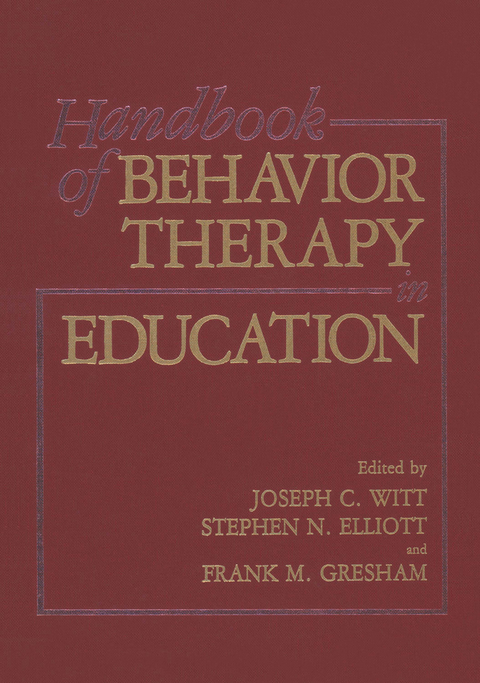
Handbook of Behavior Therapy in Education
Springer-Verlag New York Inc.
978-1-4612-8238-9 (ISBN)
I Foundations of Behavior Therapy.- 1 Behavior Therapy and the Educative Process.- 2 Research Methodology and Measurement.- 3 Behavioral Assessment.- 4 Diagnosis and Classification.- II Technical Issues in the Use and Dissemination of Behavior Therapy.- 5 Acceptability of Behavioral Treatments in Educational Settings.- 6 Developmental Factors and Their Relationship to the Identification and Treatment of Behavior Problems of Childhood.- 7 Treatment Effect Norms.- 8 An Evaluation of Behavioral Interrelationships in Child Behavior Therapy.- 9 Dissemination of Behavioral Procedures in the Schools: Issues in Training.- 10 Behavioral Consultation: Macroconsultation for Instructional Management.- III Problems and Challenges for Behavior Therapy.- 11 Generalization and Maintenance of Treatment Effects.- 12 On the Ecological Validity of Behavior Modification.- 13 Helping, Helplessness, and Harm.- 14 Legal Issues in School-Based Behavior Therapy.- IV Behavior Change Strategies.- 15 Thought and Action in Educational Interventions: Cognitive-Behavioral Approaches.- 16 Home-Based Reinforcement Procedures.- 17 Reductive Procedures.- 18 The Token Economy.- 19 Self-Monitoring.- 20 Social Skills: Conceptual and Applied Aspects of Assessment, Training, and Social Validation.- 21 Biofeedback.- V The Practice of Behavior Therapy with Specific Problems and Populations.- 22 Early Intervention: Infants, Preschool Children, and Families.- 23 Learning-Disabled Children.- 24 Mild and Moderate Mental Retardation.- 25 Conduct and Attention Deficit Disorders.- 26 Fears and Phobias.- 27 Behavioral Habilitation of Students with Severe Handicaps.- 28 Childhood Depression.- 29 Medical and Health-Related Disorders.- VI The Future of Behavior Therapy in Education.- 30 Behavioral Reform of Education: A Venture at Risk.- 31 The Future of Behavioral Analysis in Educational Settings.
| Zusatzinfo | 7 Illustrations, black and white; XXII, 856 p. 7 illus. |
|---|---|
| Verlagsort | New York, NY |
| Sprache | englisch |
| Maße | 178 x 254 mm |
| Themenwelt | Geisteswissenschaften ► Psychologie ► Klinische Psychologie |
| Medizin / Pharmazie ► Medizinische Fachgebiete ► Psychiatrie / Psychotherapie | |
| Sozialwissenschaften ► Pädagogik | |
| ISBN-10 | 1-4612-8238-1 / 1461282381 |
| ISBN-13 | 978-1-4612-8238-9 / 9781461282389 |
| Zustand | Neuware |
| Haben Sie eine Frage zum Produkt? |
aus dem Bereich


